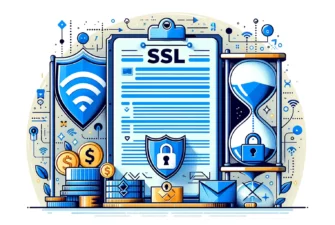
Securing different websites across thousands of niches with one standardized SSL certificate is not feasible. Each site has specific security requirements. That’s why various types of SSL certificates exist.
Certificate Authorities, the entities that issue SSL certs, try to accommodate every kind of site, from blogs to massive e-commerce platforms. For this reason, you see a big difference in prices and features across SSL brands and products.
Choosing the ideal SSL certificate for your project may be overwhelming for the first time, but fear not. This article will walk you through all SSL cert types so that you know exactly what certificate to buy for your website.
Table of Contents
- What Are the Different Types of SSL Certificates By Validation?
- Different Types of SSL Certificates By Domain.
- Different Types of SSL Certificates By Signing.
- So, What Type of SSL Certificate Do I Need?
What Are the Different Types of SSL Certificates By Validation?
We’ll start with validation classification. When you apply for an SSL cert, the Certificate Authority needs to verify and validate your request before issuing the cert. For a basic website that doesn’t collect sensitive information proving domain ownership is enough. However, an e-store or a financial institution that processes online payments needs a stronger indicator of trust, specifically Business or Extended Validation. In total, three SSL validation types exist, all suited to different websites.
1. Domain Validation SSL Certificates
Domain Validation (DV) SSL Certificates are digital certificates that establish a secure connection between a website and its visitors. DV certificates verify the ownership of the domain by checking that the applicant has control over the domain’s DNS or email. Unlike other SSL certificate types, DV certs do not require validation of the organization’s identity.
Who Needs DV SSL Certs?
Domain Validation (DV) certs are perfect for basic websites, small blogs, online portfolios, informational sites, photography sites, and small businesses. A DV certificate is an affordable entry-level product anyone who owns a website can request. The waiting time is usually up to five minutes.
2. Organization/Business Validation SSL Certificates
Organization Validation (OV) SSL Certificates or Business Validation SSL certificates provide enhanced validation and website security. These certs require the verification of the applicant’s identity and the organization’s legitimacy, in addition to validating domain ownership. The certificate authority checks the organization’s information, such as its physical location, legal existence, and operational status.
Who Needs OV SSL Certs?
Organization Validation (OV) certs are ideal for e-commerce shops, medium size companies, startups, and NGOs. A BV certificate validates the identity of official businesses. It also helps websites comply with the strict PCI (Payment Card Industry) guidelines. If you accept credit card payments, a BV certificate is a must.
You can get a BV certificate in two to three business days providing all your documentation is correct and up to date. Upon inspecting your SSL certificates, visitors will know for sure you’re a genuine company operating in good faith.
3. Extended Validation SSL Certificates
Extended Validation (EV) Certificates offer the highest identity validation and customer trust for officially registered businesses. These certificates are issued through rigorous verification, including extensive checks of the organization’s credentials and legal status. Besides high assurance and multi-million SSL warranties, EV certificates protect against phishing attacks and feature the company’s official name in the certificate’s info panel.
Who Needs EV SSL Certs?
EV certificates are suitable for enterprises and organizations that handle sensitive user information, engage in e-commerce transactions, or operate in industries that demand increased trust, such as banking, finance, and healthcare. Additionally, businesses looking to differentiate themselves and showcase their commitment to security and customer trust may opt for EV certs to display the official company name in the certificate’s details section.
Different Types of SSL Certificates By Domain
Now that we’ve analyzed the SSL validation types, let’s look at another SSL aspect – the number of domains and subdomains a certificate can protect. SSL certificates can secure anything from a single domain to unlimited subdomains and multiple domains under one SSL installation. The most versatile SSL solution can protect up to 250 SANs and unlimited subdomains up to the first level without needing an additional cert.
1. One Domain
Single-domain certificates are the most popular products and their name is self-explanatory. They protect just one domain name and support all the validation types. You can’t use them to secure multiple domains or subdomains. However, you can get a one-domain cert for a separate subdomain.
2. Wildcard
If you serve content via subdomains, you should install a wildcard certificate. It will encrypt your main domain along with unlimited subdomains. Best of all, you can add more subdomains whenever you want and then reissue the certificate to activate them. Wildcard certificates come with Domain and Business validation only. Due to security reasons, Extended Validation wildcard certs don’t exist.
3. Multiple Domains
Sometimes you need to encrypt more than just one website. Here’s where multi-domain certificates come to the rescue. Also called SAN (Subject Alternative Name) or UCC (Unified Communication Certificate) SSL certificates, these products can secure up to 250 domains under a single SSL installation.
Most multi-domain certs protect 3 or 4 domains by default and additional SANs on request. With a single multi-domain certificate, you can secure different domains, different subdomains, and various domains and subdomains. Multi-domain certificates support all three SSL validation types.
4. Multiple Domains and Unlimited Subdomains
For the most complex needs and systems, a special multi-domain wildcard certificate allows you to protect all your subdomains and multiple domains, providing you with the ultimate flexibility. It combines the functionalities of both Multi-Domain and Wildcard certificates. With a Multi-Domain Wildcard SSL certificate, you can secure multiple fully qualified domain names (FQDNs) across different domains and unlimited subdomains for every domain. This certificate type is an efficient choice for businesses with a diverse online presence and complex security requirements.
Different Types of SSL Certificates By Signing
Digital certificates can also protect public IP addresses, software, electronic documents, and email communications. Each type follows the same advanced cryptographic protocols and is backed by a third-party Certificate Authority that verifies the applicant’s identity.
1. Public IP Address
Did you know that you can install an SSL certificate on your server without a domain name? If you’re an official company and need to secure a public IP address, special Domain and Business Validation certificates can do that. While encrypting private IP addresses is not possible, Certificate Authorities allow companies to protect a public IP. Extended Validation certificates can’t encrypt an IP address.
Who Needs an Ip Address SSL Cert?
IP address SSL certs can be necessary in cases where the website or application is accessed directly through the IP address instead of a domain name. A public IP address SSL certificate can also secure communications between a client and a load balancer/proxy when a load balancer or reverse proxy is used to distribute incoming traffic to multiple backend servers.
2. Code Signing
A Code Signing certificate is a digital certificate used to sign software code or scripts, ensuring authenticity and integrity. It provides a digital signature that verifies the publisher’s identity and assures users that the code has not been tampered with. Code signing certs help prevent the distribution of malicious or unauthorized software and enhance user trust in downloaded applications.
Who Needs a Code Signing Certificate?
Corporate developers or individual publishers who distribute software, applications, or scripts need a code signing certificate to prove their identity and pass various security filters on different operating systems. Commercial apps and free digital goods should include a code-signing certificate to protect users from cyber threats.
3. Documents Signing
A Document Signing certificate electronically signs documents, such as contracts, agreements, or legal paperwork. It adds a digital signature, ensuring its authenticity and integrity. Document Signing certificates provide legal validity and non-repudiation, as the signature is uniquely linked to the signer, and any modifications to the document after signing can be detected.
Who Needs a Document Signing Certificate?
Document Signing SSL certificates are useful for individuals or organizations that engage in electronic document workflows and require a secure and legally binding method of signing documents. Industries such as finance, legal, healthcare, and government often use such certs to authenticate the document author and ensure the integrity of the signed documents.
4. Email
An Email SSL certificate, also known as a S/MIME (Secure/Multipurpose Internet Mail Extensions) certificate, enables encryption and digital signing of email messages, ensuring their confidentiality and integrity. Email SSL certificates provide end-to-end encryption, allowing only the intended recipients to read the encrypted email content and verify the sender’s identity.
Who Needs an Email Certificate?
Email certificates are commonly used by businesses, professionals, and individuals who prioritize secure and private email communication. Whether you want to protect your personal inbox or encrypt corporate messages, there’s an email cert for any need and budget.
So, What Type of SSL Certificate Do I Need?
Website niche and structure determine the different types of SSL certificates required. If you have a personal site, a blog, or a small business website that doesn’t process online payments, a Domain Validation SSL certificate will suffice. You will still get the same encryption and protection against data theft. However, if you need to secure an e-commerce site, a nonprofit organization, or a startup, a Business Validation cert is the most viable option. It offers a higher trust and compliance with online security regulations.
If you’re in the fintech industry or banking, consider getting an Extended Validation certificate for the highest identity and trust assurance. EV certs are also suitable for large e-commerce platforms and large enterprises.
Finally, keep in mind that data encryption and identity verification go beyond websites. If you distribute digital software, validate it with a Code Signing certificate. Also, protect your personal and business emails and documents against cyber thieves with Email and Document Signing certificates.
Frequently Asked Questions
The types of SSL certs matter a lot. Just like Domain Validation SSL isn’t suitable for e-commerce and financial websites, there’s no point in getting a premium EV certificate for a blog or a small business. If you don’t know what kind of certificate you need, use the SSL Wizard to get instant recommendations tailored to your specific needs and budget.
Copy Link
You can inspect the certificate details through your web browser. Start by visiting the website for which you have the SSL certificate. Once on the website, click on the padlock icon in the address bar. This will display the SSL certificate information. Look for the “Certificate” or “Certificate Details” option and click on it to view the details.
Copy Link
The most trusted type of digital certificate is the Extended Validation (EV) SSL Certificate. EV certificates undergo a rigorous validation process, where the certificate authority conducts thorough checks to verify the identity and legitimacy of the organization. This includes validating legal existence, physical location, and operational status.
Copy Link
Save 10% on SSL Certificates when ordering today!
Fast issuance, strong encryption, 99.99% browser trust, dedicated support, and 25-day money-back guarantee. Coupon code: SAVE10



























